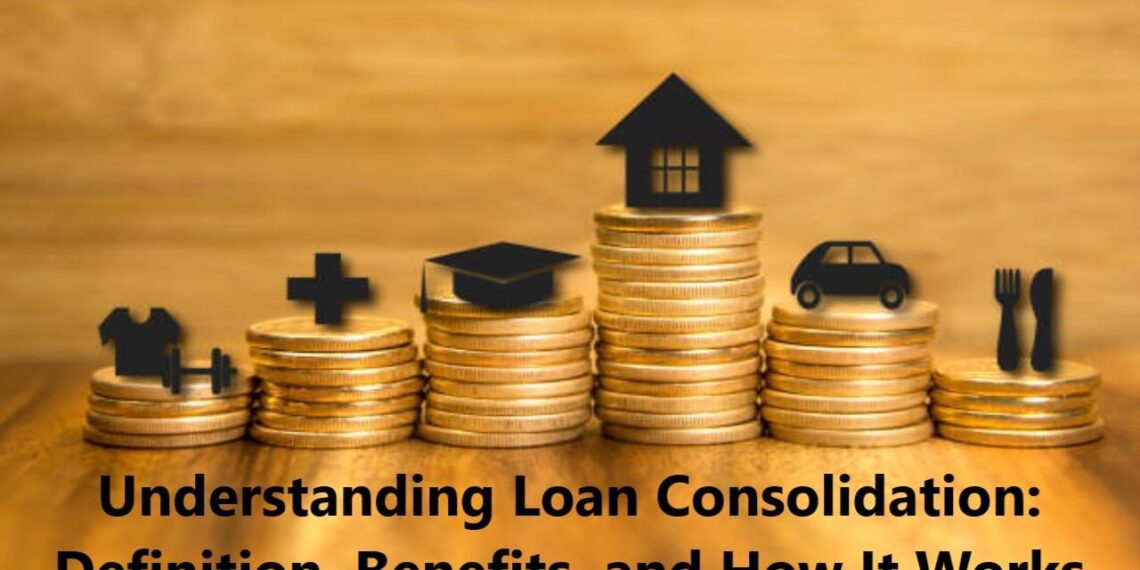Loan consolidation is a financial plan for making debt more easily manageable, better in health and maybe affordable. You have more than one debt, learning about loan consolidation will help you to reclaim control of your money. Today in this article, we’ll see how loan consolidation works, what it is, what should be kept in mind when you consider this financial instrument.
What is Loan Consolidation?
– Consolidation of loans, which is the process of summing up various debts into one loan. Generally this loan will have one rate, one repayment monthly and it is more manageable to keep your debt under control.
Loan consolidation for one’s benefit generally involves making repayment easier and if possible lower in total interest over the long run. We usually use it for credit cards, auto loans and student loans.
You may, for example, have a combination of credit card debt and personal loans, a consolidation loan can combine them into one, and you don’t have to worry about multiple payment dates and interest rates.
How Does Loan Consolidation Work?
This is how a loan consolidate works:
Assess Your Current Debts
List all your current loans with the amounts, rates and monthly payments. It will tell you how much debt you have, and if consolidation is the right option for you.
Choose a Consolidation Method
Loans – Take a personal loan to settle existing bills.
Credit Cards for Balance Transfer: Apply for a 0% introductory APR credit card to transfer your credit card balances.
Consolidation of Federal Student Loans: Federal student loans may be combined into a Direct Consolidation Loan.
Apply for a Consolidation Loan
Get a reputable lender who offers good rates. Be sure to get the new loan with an interest rate lower than your weighted average of debts.
Loans to clear Credit Card Debts :- Make Use of the Loan.
Once approved, spend the money on paying off other debts. You’ll only have one loan to attend to now.
Repay the Consolidated Loan
Make payments on your new loan each month. Paying your debts in regular installments is a must if you want to be successful with your money.
Benefits of Loan Consolidation
Simplified Debt Management
You have one loan in the bag compared to multiple ones. It keeps you from missing payment and late charges.
Lower Interest Rates
A consolidation loan has a lower interest rate than a high-interest credit card or personal loan, so you will end up saving money in the long run.
Reduced Monthly Payments
If you are able to amortize the debt, the payment can be less each month which frees up cash flow for other expenses.
Improved Credit Score
With multiple accounts cleared, your credit utilization ratio will drop which helps your credit score.
Fixed Repayment Terms
You know the total monthly payments and the maturity date for your consolidation loan so you don’t have to guess how much time you have to pay for your consolidated loan.
Types of Loan Consolidation
Debt Consolidation Loans
These are bank or credit union or internet lenders’ personal loans that consolidate unsecured debts such as credit cards and medical bills.
Balance Transfer Credit Cards
Others have 0% interest for a certain amount of time (you can move and refinance without paying any interest).
Federal Student Loan Consolidation
Direct Consolidation Loans offered by the U.S. Department of Education consolidate multiple federal student loans into one if you’re looking for flexible repayment.
HELOC, Home Equity Loans or Lines of Credit
You can borrow against the equity in your house to consolidate debts if you have one. But this method risked your home if you did not pay back.
Considerations Before Consolidating Loans
Eligibility Requirements
Lenders look at your credit score, income, and debt-to-income ratio. A good credit rating is a plus when it comes to obtaining a low interest consolidation loan.
Total Cost of Loan
You may reduce the monthly payment but the longer the loan period, the higher interest you will pay. Calculate the total amount of the consolidation loan carefully.
Origination Fees and Penalties
There are loan origination and early pay-back fees on some loans. Just don’t make the costs worth it.
Risk of Continued Debt Accumulation
Debt doesn’t go away, it just gets consolidated. Do not be tempted to add new debt to your balances as you pay off the consolidation loan.
Type of Debt
Not all loans can be cancelled. Consolidation of federal student loans, for instance, is only for qualifying federal loans and doesn’t cover private student loans.
If You Need to Consolidate Your Loan When Should You?
A loan consolidation may be right for you if:
You have multiple high-interest debts.
You want to consolidate bills into a single monthly invoice.
You have regular income and excellent credit, so you are eligible for good rates.
You’re drowning in the minimum payments but you can guarantee regular repayment on new terms.
Alternatives to Loan Consolidation
If consolidation loans aren’t right for you, here are some other options:
– DMPs (Debt Management Plans): Negotiate better rates and monthly payments with a credit counseling agency.
Debt Settlement: Make a deal with the creditors to pay less.
Bankruptcy: If you can’t make it work in the end, try bankruptcy to get rid of your debts, but that can hurt your credit a lot down the road.
Final Thoughts
Consolidating loans is an efficient way to cut down on the number of debts and the amount of stress. Once you know the loan consolidation definition and what is it, you can make better financial decisions according to your situation. But be sure to calculate the cost per unit, your eligibility, and whether you are able to commit to regular repayments. In the right hands, loan consolidation is a means to long-term financial stability.






